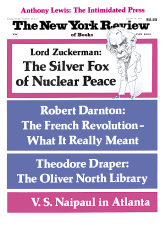In response to:
Freud's Cordelia from the November 24, 1988 issue
To the Editors:
Michael Ignatieff in his review of Anna Freud: A Biography [NYR, November 24, 1988], wrote: “Her [Anna Freud] last years were miserable, weakened by illness, tormented by literary adventurers like Jeffrey Masson, whom she mistakenly gave access to the papers in Maresfield Gardens for his patricidal edition of the Freud/Fliess correspondence.” Anna Freud herself published the first edition of the Freud–Fliess correspondence in 1950, omitting almost half of the letters. When Anna Freud and the Freud Copyright gave me access to Freud’s letters and papers in 1980 it was for the explicit purpose of producing a complete edition of this most valuable of all Freud’s correspondence. I completed my mandate, and the letters were published by Harvard University Press in 1985 (The Complete Letters of Sigmund Freud to Wilhelm Fliess, 1887–1904—translated and edited by Jeffrey Moussaieff Masson). Anna Freud did not live to see the edition published, but we discussed its contents over several years, and although we did not see eye to eye on the history of psychoanalysis, there was never any suggestion from her that I was in any way guilty of distorting the historical record in my edition. My views about the significance of these letters, which differed considerably from established opinions, were published separately in my book The Assault on Truth: Freud’s Suppression of the Seduction Theory. Indeed, most reviewers of the complete letters seemed to agree that I had produced a scholarly edition which was free from bias, mine or anyone else’s. Quite apart from the silliness of calling an edition “patricidal,” isn’t it time that we stopped using psychoanalytic interpretations as covers for insults? Surely I, or anybody else, has a right to disagree with Freud over the significance of child-abuse without being treated to the cliches of parlor psychoanalysis over our motives. When, in 1932, Sándor Ferenczi disagreed with Freud over the reality of incest, Ernest Jones (his analysand, by the way) accused him of being paranoid, and homicidal. All he meant, it turned out, was that Ferenczi disagreed with Freud. For some analysts, evidently, to disagree with Freud is to want to kill him, even if that disagreement is over matters which, in 1988, we know more about than Freud could have. To her credit, when Anna Freud and I disagreed, which was often, she never attempted to make ad hominem attacks disguised as clinical judgments. In fact, when other analysts suggested I was “resistent” (using the simplistic jargon-word), thereby ending all reasoned discussion, she comforted me by telling me that her father had once said to her, “never analyze anyone unless they pay you.”
Jeffrey Moussaieff Masson
Berkeley, California
Michael Ignatieff replies:
- I used “patricidal” to refer to Anna Freud’s reaction to Masson’s interpretation of her father’s work. Having reread the passages in the Young–Bruehl biography which discuss Anna’s growing dismay about what she saw as a misuse of his position of trust, I see no reason to withdraw the word.
-
My objection is not to the scholarship of Masson’s edition of the Freud–Fliess letters, but to the interpretation he offers of them in The Assault on Truth: Freud’s Suppression of the Seduction Theory. Having reviewed the book elsewhere, I see no reason to rehearse these objections.
-
If Mr. Masson thinks my use of “patricidal” amounts to “using psychoanalytic interpretations as covers for insults,” that is his problem, not mine. I had no such intention.
This Issue
January 19, 1989



